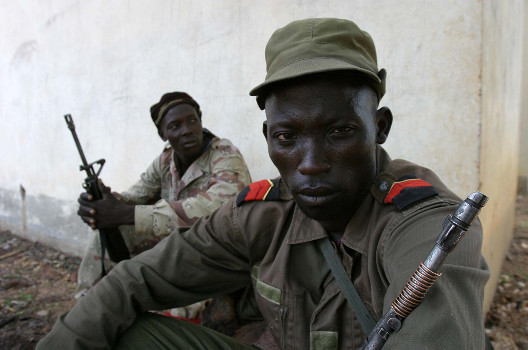 Buried at the bottom of page A8 of Thursday’s New York Times was a brief Associated Press report that Armel Sayo, Minister of Youth and Sports in the transitional regime of the Central African Republic (CAR), who had been abducted more than two weeks earlier, had been freed. According to the account, the exact circumstances of the official’s release “were not immediately clear.” However, what one can be certain of is that the fact the man in question is a “minister” in what passes as a “government” for the conflict-ridden country underscores the incredible challenges facing both its people and the international community that has intervened with a blue-helmeted force in an attempt to stop the violence.
Buried at the bottom of page A8 of Thursday’s New York Times was a brief Associated Press report that Armel Sayo, Minister of Youth and Sports in the transitional regime of the Central African Republic (CAR), who had been abducted more than two weeks earlier, had been freed. According to the account, the exact circumstances of the official’s release “were not immediately clear.” However, what one can be certain of is that the fact the man in question is a “minister” in what passes as a “government” for the conflict-ridden country underscores the incredible challenges facing both its people and the international community that has intervened with a blue-helmeted force in an attempt to stop the violence.
I first heard about Mr. Sayo last November when the Atlantic Council’s Africa Center, in partnership with Search for Common Ground, hosted an interfaith delegation of religious leaders who have spearheading efforts to halt CAR’s descent into chaos. The three—Imam Oumar Kobine Layama, President of the Central African Islamic Community; the Most Reverend Dieudonné Nzapalainga, Roman Catholic Archbishop of Bangui; and Pastor Nicolas Guérékoyame-Gbangou, President of the CAR Evangelical Alliance—questioned both the effectiveness of the international response to the country’s crisis to date as well as the sagacity of its push for elections later this year before peace has been restored, much less reconciliation achieved. As an example of the malaise that afflicts the regime of interim President Catherine Samba-Panza, installed a year ago at the behest of the subregional Economic Community of Central African States (CEECA) and French President François Hollande, the religious leaders highlighted the curious case of the minister of youth and sports.
It turns out that, in late 2013, amid the increasingly bloody struggle between the predominantly Muslim Séléka rebels who had seized power earlier in the year and the mainly Christian anti-balaka militias—a fight that the French government described as the time as putting CAR “on the verge of genocide”—a onetime captain of the disintegrated CAR army named Armel Ningatoloum Sayo got together with a Belgian national who was the object of an international arrest warrant for murder in Belgium named François Toussaint and set up their own little movement, dubbing it “Révolution et justice.”
Sayo declared himself “commandant” of the group with Toussaint who, according to United Nations sources, has been implicated in the training of Mai Mai fighters in the Democratic Republic of the Congo, as “general.” Rounding out the “chain of command” were several non-commissioned officers from the former national military whom “Commander” Sayo brevetted up to the “colonel” and “lieutenant colonel” rank. The group set up a training camp near the border with Chad and Cameroon and quickly gathered several hundred recruits from the unemployed and hungry youth of the area.
In early 2014, with the tacit agreement of the Cameroonian peacekeepers deployed nearby not to interfere, Révolution et justice fighters quickly gained control of several nearby villages, primarily targeting members of the mostly Muslim Fulani ethnic group. Eventually they came into conflict with Séléka units and then the Chadian peacekeeping contingent, which forced them to withdraw after hundreds of the would-be revolutionaries were killed. Rather than simply slink away, Sayo instead marched his remaining band towards the national capital of Bangui.
Worried about the spectre of yet another armed band joining the fray, Samba-Panza’s interim government invited Révolution et justice’s commandant to take part in the “national dialogue” being hosted in Brazzaville, Republic of the Congo. Having left his fighters in the field, Sayo joined the talks and, at the end of August 2014, was appointed Minister of Youth and Sports in thirty-member cabinet of Prime Minister Mahamat Kamoun. As one of the religious leaders said to me with a twinkle in his eye, “He never looked back. As far as I know, he never even visited the encampment where he left his fighters.”
The report late last year of the Panel of Experts mandated by the UN Security Council is pretty succinct in its assessment: “The appointment to the post of Minister of Youth and Sports in the new transitional cabinet of the leader of an armed group called Révolution et justice reinforces the prospect that being the commander of a politico-military movement could lead to top governmental positions and therefore validates the strategy of political spoilers.” Until this perverse incentive is eliminated, basic security—to say nothing of real peace—will continue to prove elusive for those poor souls caught in conflict zones like the Central African Republic.
J. Peter Pham is Director of the Atlantic Council’s Africa Center. Follow the Africa Center on Twitter at @ACAfricaCenter.
Image: A CAR rebel soldier. Photo by hdptcar. Licensed under Creative Commons.
